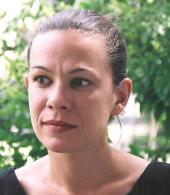Backstory
Authors tell you what inspired their work
Sara Gran, author of "Dope"

It's probably true that you write the books you'd like to read. One day I started, just for fun, writing a book I had always wanted to read; a mystery novel as hard-boiled as I could make it, but with two significant restrictions: I wanted a woman in the lead role, and I wanted to make all the characters as real as I could, rather then rely on the conventions of noir, or the conventions of society at large (for example, the conventional wisdom that drug addicts are evil and heartless, that family is always kind and helpful, and so on). I loved old mystery novels and noir films (and still do), but as dark as some of them are, I felt like few were honest enough. Most seemed to stop short of some truth about the detective and his client, and I wanted to go beyond that point, to get at a deeper, more resonant place in the mystery. A further restriction I set for myself as I went along was that, aside from all my high-flying literary ideas, the book had to be an engaging mystery as well. I'd read plenty of "literary" mysteries that were neither.
I'm not sure how well I succeeded on any of those counts, but the next thing I knew, it was nighttime and I had about fifty pages of what became Dope. Those fifty pages never made it into the final book, but the character of Josephine Flannigan was perfectly formed. Josephine was in her mid-to-late thirties, attractive but not extraordinarily so, smart but not educated, and deeply scarred. She had a strong will to live despite great sadness and sometimes overwhelming guilt. And she was a former heroin addict, searching for a current one.
There is an old, old joke where a drug addict says, "I used to have so many problems. Now, I only got one." The same was in some ways true of writing Dope. Heroin became a focal point for me while I wrote it, and so far has been a focal point for readers as well. You can understand part of the drug's appeal to users in that it's a useful organizational tool. I knew enough about the history of drugs to know that there were addicts in 1950, but I wasn't aware of the scope of the problem until, as so often happens, some research turned up a strange little nugget of history: in 1950 there had been a flood of cheap heroin in New York, and a new heroin subculture was formed. Some early readers of Dope had trouble believing that drugs were a problem in the 1950s. But heroin was first synthesized in 1874, and the first addicts developed quickly afterwards. By 1914, with the passage of the Harrison Act, heroin was made illegal in the US. No one would have bothered to pass the law, of course, if heroin addiction wasn't already becoming a problem. The drug was common enough in the underworld by the 1930s. Difficult to get during World War II, it was cheap and easy to come by afterwards.
Through my usual brilliant combination of dumb luck and other people's kindness, I ended up with the dream-like combination of Dan Conway as my editor and Putnam as my publisher. I don't know what people are talking about when they say that "Editors no longer edit," because every editor I've ever worked with has edited plenty. Towards the end of the editing process with Dan, just as I thought we were wrapping stuff up, it turned out Dan had an entirely different idea then I did of one the largest components of any mystery novel: Who Did It. If someone's read a book, closely, a number of times, and still doesn't get it, it's kind of hard to look anywhere but towards the writer for an explanation -- this just doesn't happen if the writer has done their job. Over the next twenty-four hours or so I changed a number of little odds and ends and put in a few hundred more words here and there to clear things up, and the book is immeasurably improved by those few small changes. At the very least, the reader, at the end, now knows Who Did It.
Sara Gran is the author of Dope.Visit her at her her website.

